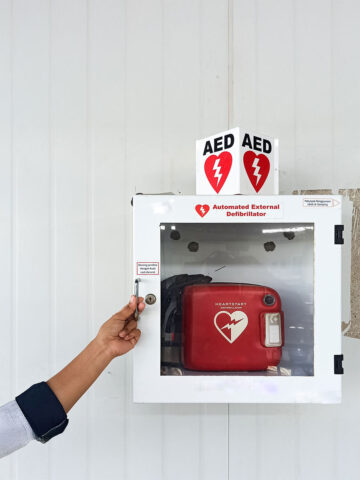Reports of people experiencing inflamed heart muscle, or myocarditis, after receiving an mRNA COVID-19 vaccine are understandably worrisome to parents. Here, learn more about this rare side effect – and why health experts still recommend all eligible people receive the vaccine.
First, what is myocarditis and pericarditis?
Myocarditis is the inflammation of the heart muscle, and pericarditis is the inflammation of the pericardium, or tissue that creates a sac-like structure that encloses the heart to keep it in place. There are many causes of this inflammation, including infection, autoimmune diseases, medicines and environmental factors.
Does the COVID-19 vaccine cause myocarditis?
Health officials have observed an increased risk for myocarditis among people who have received an mRNA COVID-19 vaccine, particularly males ages 12 to 29 years.
The number of cases, however, is small: As of June 11, the Vaccine Adverse Event Reporting System – or VAERS, the federal vaccine safety monitoring system – received 1,226 reports of myocarditis after mRNA COVID-19 vaccination, and not all those reports were verified cases. As of the same time period, approximately 296 million doses of the vaccine had been administered in the United States, 52 million of which were to people ages 12 to 29 years.
Of those doses, 30 million were first doses and 22 million were second doses. Incidences of myocarditis have occurred more after the second dose than the first, and typically appeared within a week of vaccination.
Should my child still get the vaccine even if there is an increased risk of myocarditis?
Yes. The U.S. Centers for Disease Control and Prevention’s Advisory Committee on Immunization Practices (ACIP) concluded in June 2021 that the benefits of vaccinating all recommended age groups with the COVID-19 vaccination clearly outweigh the risks of vaccination, including the risk of myocarditis after vaccination.
Additionally, according to the American Academy of Pediatrics, myocarditis and pericarditis are much more common in people who contract COVID-19, and the risks to the heart from COVID-19 infection can be more severe.
Health officials will continue to monitor outcomes of myocarditis cases after vaccination and will educate healthcare providers and the public about myocarditis cases and the use of COVID-19 vaccines.
What if my child develops myocarditis after receiving the COVID-19 vaccine?
While having a sick child can be scary or stressful in any case, the good news is that myocarditis is highly treatable.
In many cases, myocarditis resolves on its own. In some cases, medication may be needed, and in very severe cases, intravenous medication or other interventions may be required.
What are symptoms of myocarditis?
Symptoms of myocarditis or pericarditis include acute chest pain, shortness of breath or heart palpitations.
What should I do if my child has symptoms?
Parents should contact their pediatrician if their child experiences these symptoms.
If a pediatrician suspects the child has myocarditis or pericarditis after conducting a physical exam and comprehensive history, they will likely consult with a cardiologist, infectious disease specialist and rheumatologist. Evaluations may also include an electrocardiogram and blood tests.
Bigger picture, why do we need to vaccinate teens and kids if their risk of serious COVID-19 complications is low?
Vaccinating children against COVID-19 is very important. We know the disease is not completely benign in children. In addition to requiring some children to be hospitalized for treatment, COVID-19 can lead to Multisystem Inflammatory Syndrome in Children (MIS-C). We also know that children with COVID-19 at are risk for long-term complications, the extent of which is still fully unknown. Additionally, there are children who are exhibiting COVID “long haul” symptoms.
Even if a child had no risk of long-term illness or COVID-19 complication, they might still spread the disease to others, who may have more pronounced risks. Further, we need to eliminate pockets of vulnerability where the virus can continue to live and replicate and mutate into new variants. Those new variants may not be as effectively blocked by the vaccine.

In addition, children younger than 18 account for about 22 percent of the population. In order for us to reach a population wherein 70 to 80 percent of people are immune to COVID-19 – a term called “herd immunity” – children must be included in that ratio.
Higher levels of immunity will allow us to continue to open up the economy, resume a normal life and feel very confident in enrolling children in in-person learning, sports and activities. We need kids to return to school for their educational, physical, social and emotional health.
Get more expert health advice delivered to your inbox monthly by subscribing to the KidsHealth newsletter here.
Learn more about COVID Vaccines for Children and Teens
Get answers to your frequently asked questions – and some peace of mind – with this complete guide to COVID-19 vaccines from CHOC pediatric experts.





